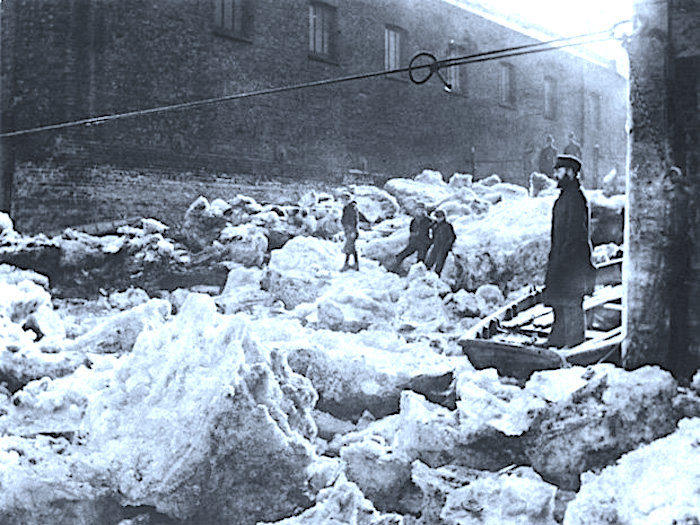Eksperter fortalte Daily Star Online at planeten jorden står til at gå ind i en "lille istid" i løbet af de næste tre år, takket være en blanding af klimaforandringer og lav solaktivitet. Forskning viser, at en naturlig nedkølingscyklus, som optræder efter hver 230 år, begyndte i 2014 og vil sende temperaturene endnu lavere ned, når vi når 2019.
Videnskabsfolk forventer også en "kraftig reduktion" i solaktiviteten igennem 33 år, fra 2020 og 2053, som vil sende termometrene i bund. Begge cykler tyder på, at jorden går ind i en global nedkøling, som vil have ødelæggende konsekvenser for den globale økonomi, menneskeligt liv og samfundet, som vi kender det.
Hvis forudsigelserne om en stor verdensomspændende nedfrysning finder sted, vil temaet fra filmen fra 2004 "The Day After Tomorrow" ikke være langt fra virkeligheden om vintren. Millioner af menneskeliv vil være i fare på grund af langvarige strømsvigt, mangel på mad og energi og kulderelaterede sundhedsproblemer.
Kommentar: Delvist oversat af Sott.net fra Britain: Upcoming little ice age predicates River Thames freezes over by 2019, could kill millions
Interessant nok at der har været udsædvanlige hændelser i vejret over nordeuropa:
kill-millions?utm_content=buffer74264&utm_medium=social&utm_source=facebook.com&utm_campaign=buffer
David Dilley, CEO of Global Weather Oscillations, told Daily Star Online global warming and cooling cycles are determined by the gravitational forces of the Earth, moon and sun.
Each cycle lasts around 120,000 years, with sub-cycles of around 230 years.
He said: "We have had five warming cycles since about 900AD, each followed by a dramatic cooling cycle. "The last global warming cycle ended in 1790 and the year 2020 is 230 following this - thus I have been talking about rapid cooling beginning in 2019."
He said the oncoming cooling will send temperatures plummeting to lows last seen in the 1940s - when the mercury bottomed out at -21C during winter in the UK. He said: "Cooling from 2019 into about 2020 to 2021 will bring world temperatures back to where they were in the 1940s through the 1960s.
"The Arctic will freeze solid and rapidly by 2020 and thus allow much more Arctic air to build up and move southward toward Great Britain. "Expect by the mid to late 2020s that winter temperatures will dip even colder than the 1940s to 1960s. This will last for 60 to 100 years and then a gradual warm-up toward the next global warming cycle that will not be as warm as the one we are now coming out of."
Research from mathematics professor Valentina Zharkova shows that low solar activity could cause global temperatures to dip to their lowest levels for more than 350 years. Within three years drastic reductions in heat-releases from the sun could drive substantial cooling in Europe, North America and Asia.
From 1650 to 1710, temperatures across much of Europe - including Britain - plunged when the sun entered a quiet phase known as the Maunder Minimum. Zharkova believes a similarly extreme deep freeze is on the way - triggering new glaciers, blanket sea ice and frozen over rivers and lakes.
She told Daily Star Online: "We did not calculate temperature variations on the Earth, we can only speculate what should happen by relying on the experience of the previous grand-cycle occurred in the 1645-1705 Maunder Minimum. "At that time the mini ice age lasted for 60-65 years. The forthcoming grand minimum will last for three solar cycles, or 33 years, from 2020 to 2053, as we predicted.
"Because of huge reduction of solar activity it is expected that the terrestrial temperature will be also reduced as it has happened in 17th century."
Zharkova, of Northumbria University, made the predictions by studying new mathematical models for solar activity. She claims her models can predict the solar cycle with 97% accuracy, leaving little margin for error.
The Met Office has previously told Daily Star Online that a new mini-ice age is a "worst case scenario", adding that while temperatures are likely to dip, it will do little to offset man-made global warming.
George Feulner, of the Potsdam Institute on Climate Change Research, agrees with this view, adding: "The expected decrease in global temperature would be 0.1 degrees Celsius at most, compared to about 1.3 degrees Celsius since pre-industrial times by the year 2030."




Kommentar: The lead argument has evidential and historical validity and its predictions are prudent. Notably the final conclusion, of both the Met Office and Potsdam Institute on Climate Change Research, substantiates, qualifies and quantifies the results according to an unshakable belief in a proven-to-be bogus premise. However, when you factor in the increases in cosmic dust, volcanic dust, earthquake activity, weather pattern changes combined with a long-lasting solar minimum...it is complete idiocy to think all of these are not related, nor will have significant impact on the temperature and climate of Earth.